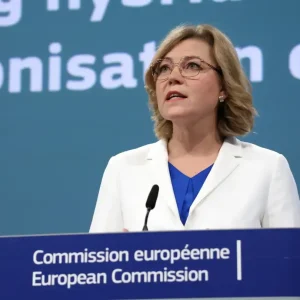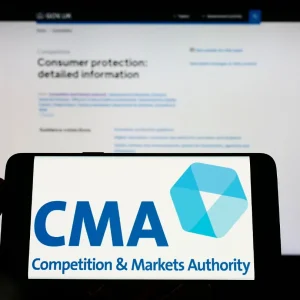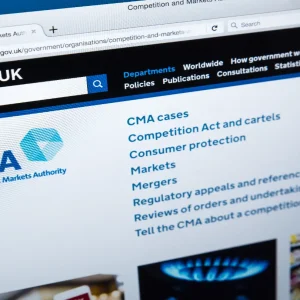
The US and European Union further cemented their transatlantic tech partnership during the second Trade and Technology Council (TTC) meeting this weekend, with further cooperation agreed on a wide range of issues ranging from coordinated sanctions on Russia to harmonised standards in emerging technologies.

“In less than a year, the TTC has become a pillar of transatlantic cooperation, particularly in growing our bilateral trade and investment relationship; resolving existing and avoiding new barriers to trade with countering non-market, trade distortive practices, and in our united response to Russia’s aggression in Ukraine,” a joint statement by European Commission president Ursula von der Leyen and US president Joe Biden read, released at the culmination of the meeting in Saclay, France.
What is the EU-US Trade and Technology Council?
First announced last year, the TTC goes beyond a partnership on technological, economic and trade issues to encompass democratic values the two parties are eager to export. “We really see that this deeper cooperation not only will help to deepen our trade and economic ties, but it will also help us to articulate a vision of the kind of world we want to see, and to help preserve the rules-based international order that we have created over the last 70 years,” a senior US official told journalists.
Officials were also keen to highlight the apparent success of coordinated sanctions on Russia following its invasion of Ukraine. The US and the EU have imposed crippling export controls on a wide range of technologies designed to “cut off Russia’s industry from the technologies desperately needed today to build a future.” More than $10bn worth of critical technologies have since been cut off to Russia.
“We have cooperated closely to impose significant consequences on Russia for its continued aggression against Ukraine,” the joint statement read. “The foundation for cooperation that we initiated through the Trade and Technology Council was indispensable for fostering the unprecedented coordination on export controls and sanctions in response to Russia’s further invasion of Ukraine, both between the EU and United States and with other allies and partners.”
The two parties are planning to use this experience of cooperation to “support further common approaches” that will include an update of restricted exports to Russia and to cooperate with other countries beyond the United States and the European Union. Apart from sanctions, there was an emphasis on the vulnerability of technological supply chains that have been laid bare following Russia’s invasion of Ukraine.
“We intend to share information on our individual approaches to the security of sensitive and critical areas of the ICT supply chain, including steps we are taking to restrict the use of high-risk suppliers,” the statement read. These sensitive and critical supply chains include 5G telecommunications networks, undersea cables, data centers, as well as cloud infrastructure.
Greater co-operation on standards, 6G and chips
Cooperation on technological standards for digital identities and the Internet of Things were also identified as “additional areas of interest” that the two parties will explore. Common approaches towards next-generation networks like 6G were also noted to be “particularly relevant”. A more comprehensive list of priority areas for technology standards cooperation will be revealed by the end of this year, according to the joint statement.
In the field of artificial intelligence, a shared repository of “metrics and methodologies” to measure AI trustworthiness was announced to assess the technical requirements for such systems and bias mitigation. Plans for the development of interoperable approaches for managing AI risks were also mentioned, with the aim of enabling “globally beneficial products and services”. A joint roadmap on these plans will be shared at the next TTC Ministerial Meeting and will reportedly include the perspectives of stakeholders from civil society groups, academia and the private sector.
In what could be seen as a thinly-veiled barb directed at China, the statement also announced that the European Commission has begun research into the risks involved in AI-driven social scoring systems and “possible mitigation steps”. China uses such a system to score citizens on their supposed “trustworthiness”, but last year signed a United Nations pledge which aims to ban such practices.
The ongoing semiconductor shortage was also high on the agenda, as the two parties revealed plans for a common early-warning mechanism to monitor possible supply chain disruptions. Various US government agencies and the European Commission will participate in a two-month pilot to develop such a system and would involve fortnightly meetings to discuss potential risks, while “ad-hoc” meetings could be set up in the event of “unexpected scenarios”.
In a call with journalists, a senior US administration official did not provide a timeline for the establishment of the early warning system, but said that the several embassies in Southeast Asia had begun work last year to track key “semiconductor-oriented production sites” in the region to understand when disruptions might happen. “This is really a chance for us to expand that work and multilateralise it with our European partners,” the official said.






